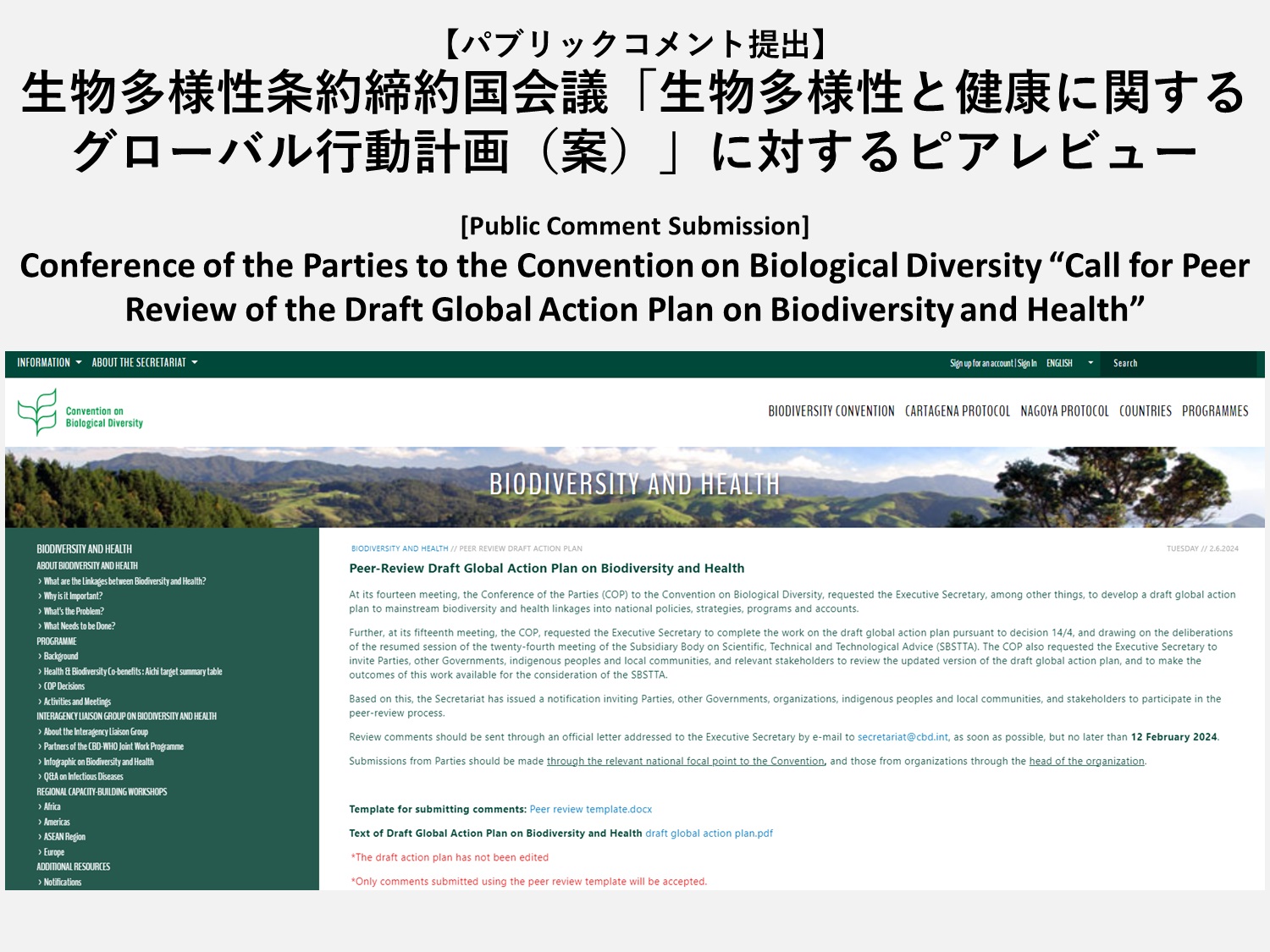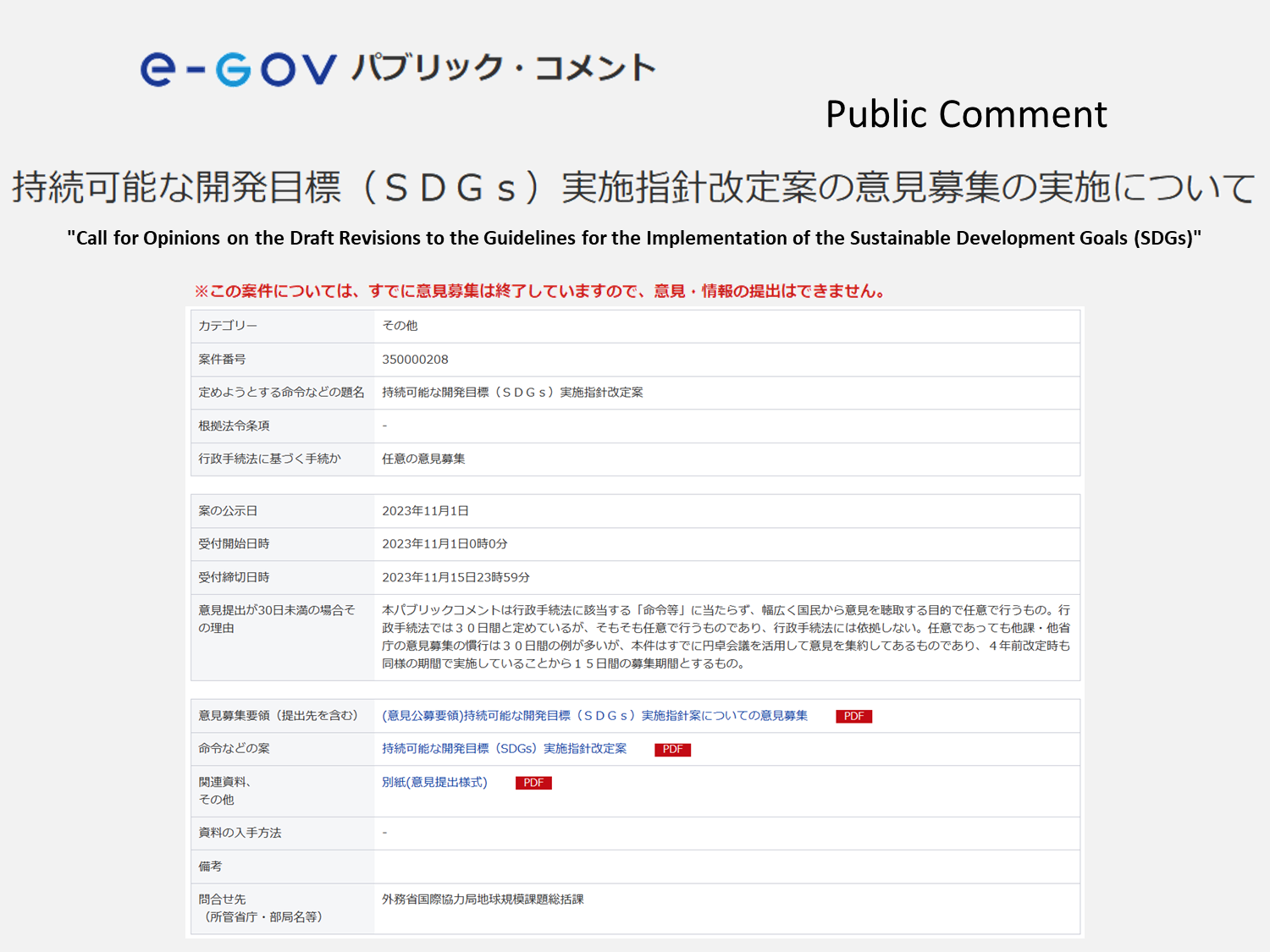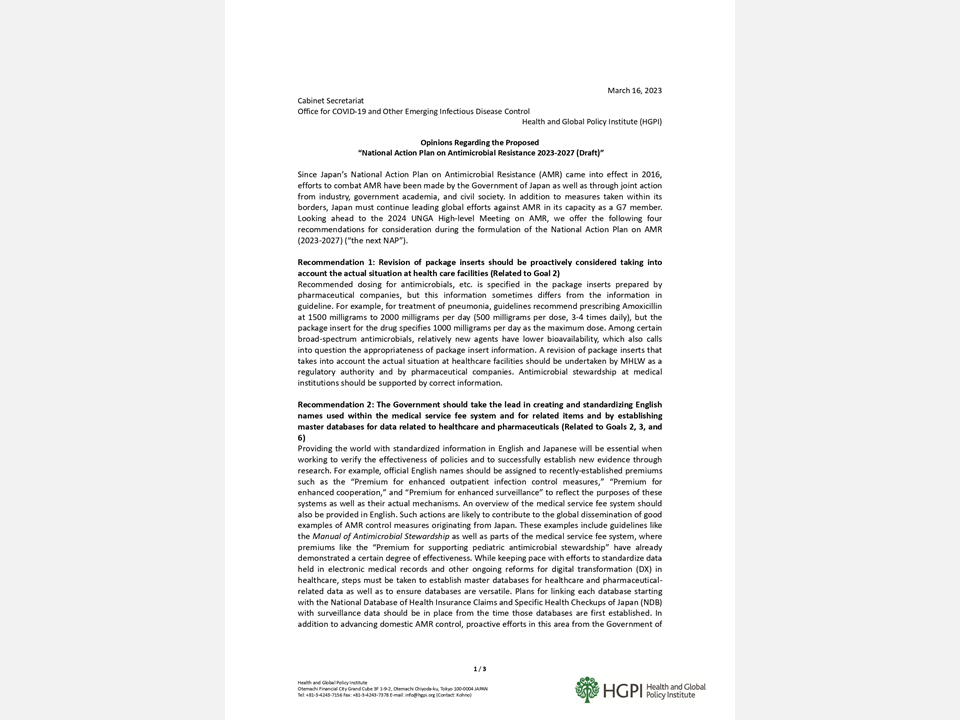[Public Comment Submission] “The Basic Policy for Environmental Conservation Activities, Encouragement of Willingness for Environmental Conservation, Environmental Education, and Promotion of Collaborative Efforts” (March 1, 2024)
date : 3/8/2024
Tags: AMR, Planetary Health
![[Public Comment Submission] “The Basic Policy for Environmental Conservation Activities, Encouragement of Willingness for Environmental Conservation, Environmental Education, and Promotion of Collaborative Efforts” (March 1, 2024)](https://hgpi.org/en/wp-content/uploads/sites/2/HGPI_240301_ENVeyecatch.jpg)
Health and Global Policy Institute’s Planetary Health Team and Antimicrobial Resistance (AMR) Team submitted their written opinion on the draft of “The Basic Policy for Environmental Conservation Activities, Encouragement of Willingness for Environmental Conservation, Environmental Education, and Promotion of Collaborative Efforts” by the General Policy Division of the Minister’s Secretariat within the Ministry of the Environment.
Advancing environmental conservation activities contribute to developing a sustainable society, and it is important to encourage willingness for activities through efforts such as environmental education. Mutual collaboration between citizens, corporations, private bodies, and the State as well as local governments is also meaningful in environmental conservation. In June 2011, “The Law for Enhancing Motivation on Environmental Conservation and Promoting of Environmental Education” (“the Law”) was announced, which aimed to further promote environmental conservation activities and environmental education.
In June 2012, the Cabinet decided “The Basic Policy for Environmental Conservation Activities, Encouragement of Willingness for Environmental Conservation, Environmental Education, and Promotion of Collaborative Efforts” (“the Basic Policy”) based on the Law., The Basic Policy is to be reviewed roughly every five years and amendment is under consideration.
The public comment includes the following perspectives:
- Regarding environmental conservation and environmental education including in higher education and jobs, it is essential to consider viewpoints on linkage between humans, animals and the ecosystem, namely “planetary health”, which includes the “One-Health Approach”.
- The global crisis of climate change, biodiversity loss, and pollution interacts with economic and social challenges and adversely affects the health of humans and animals by an increase of emerging/re-emerging infectious diseases, particularly AMR, zoonotic diseases spillover such as bird influenza and febrile illness mediated by ticks and mosquitoes.
- The Programme for International Student Assessment (PISA) for 15-year-old students, which is offered by the Organization of Economic Cooperation and Development (OECD), will contain questions about the interconnectedness between humans and the ecosystem in the next 2025 version and should be utilized in environmental education.
- Universities, graduate schools, and research institutions have the core function of linking industry, government, academia, and citizens and should promote decarbonization of themselves and interdisciplinary education and research.
- The State and local Governments should lead by example in environmental conservation activities, develop criteria to evaluate and praise advanced activities of corporations and private bodies and build awareness among investors and shareholders as well as citizens.
For more information on this public comment, please click here. (only available in Japanese)
Top Research & Recommendations Posts
- [Research Report] Building a Mental Health Program for Children and Measuring its Effectiveness (June 16, 2022)
- [Research Report] 2019 Survey on Healthcare in Japan
- [Policy Recommendations] Developing a National Health and Climate Strategy for Japan (June 26, 2024)
- [Announcement] A Turning Point Towards Building Green Healthcare Systems (June 5, 2024)
- [Research Report] The 2023 Public Opinion Survey on Satisfaction in Healthcare in Japan and Healthcare Applications of Generative AI (January 11, 2024)
- [Policy Recommendations] Obesity Control Promotion Project 2023 “The Next Steps for Engaging and Cooperating with Patients, Citizens, and Communities for Implements of Obesity Control Measurements” (April 8, 2024)
- [New Report] Policy Priorities for Super-Ageing Japan: Health Innovation and Economic Growth in the COVID-19 Pandemic Era (February 24, 2021)
- [Policy Recommendations] Kidney Disease Control Promotion Project 2023 “Establishing Kidney Disease Control Measures with Patient, Citizen, and Community Engagement and Collaboration” Policy Recommendations, a Collection of Good Practices of Chronic Kidney Disease (CKD) and Control Measures in Local Governments (February 14, 2024)
- [Report and Recommendations] Discussion Points in Healthcare DX Project Expert Panel Meeting (April 2, 2024)
- [Policy Recommendations] Achieving Equity in Multidisciplinary Pain Treatment and Support Systems for Pain Management (March 31, 2023)
Featured Posts
-
2024-10-07
[Registration Open] Planetary Health Expert Meeting “Building the Future of Healthcare: A Vision for Sustainable and Resilient Health Systems with GGHH” (November 5, 2024)
![[Registration Open] Planetary Health Expert Meeting “Building the Future of Healthcare: A Vision for Sustainable and Resilient Health Systems with GGHH” (November 5, 2024)](https://hgpi.org/en/wp-content/uploads/sites/2/ph-20241105-topr2.jpg)
-
2024-10-28
[Registration Open] (Hybrid Format) Public Symposium “Promoting CVD Control Based on the Needs of People Living with or Affected by Cardiovascular Diseases: Towards Effective Implementation of the Second Phase CVD Control Plans” (November 22, 2024)
![[Registration Open] (Hybrid Format) Public Symposium “Promoting CVD Control Based on the Needs of People Living with or Affected by Cardiovascular Diseases: Towards Effective Implementation of the Second Phase CVD Control Plans” (November 22, 2024)](https://hgpi.org/en/wp-content/uploads/sites/2/cvd-ncd-20241122-top.png)
-
2024-10-30
[Event Report] Advisory Board Meeting for Meaningful Involvement Promotion Project “Promoting People with Lived Experience Participation in Policy-Making: Building a Social Foundation for Proactive Engagement” (September 11, 2024)
![[Event Report] Advisory Board Meeting for Meaningful Involvement Promotion Project “Promoting People with Lived Experience Participation in Policy-Making: Building a Social Foundation for Proactive Engagement” (September 11, 2024)](https://hgpi.org/en/wp-content/uploads/sites/2/mip_20240911.jpg)
-
2024-10-31
[HGPI Policy Column] (No.49) From the Mental Health Project ”Changes in the Japanese Mental Health Policy and Future Policy Topics” (The 2nd part ”Issues surrounding long-term hospitalization and future policy topics”)
![[HGPI Policy Column] (No.49) From the Mental Health Project ”Changes in the Japanese Mental Health Policy and Future Policy Topics” (The 2nd part ”Issues surrounding long-term hospitalization and future policy topics”)](https://hgpi.org/en/wp-content/uploads/sites/2/column-49-top.png)







